Ab-Titchaz
JF-Expert Member
- Jan 30, 2008
- 14,631
- 4,225
Blast fishing destroying Tanzania's marine habitats
By Gladys Njoroge BBC Africa, Tanzania

The rich marine life off Tanzania's coast is coming under threat because of blast fishing - a technique using explosives that some fishermen use to maximise their catch.
''Blast fishing destroys the fish habitats under water where fish reproduce and that has had a big impact, especially on us who use ring nets to fish," a 32-year-old fisherman says.
"The number of fish has drastically reduced we are not able to catch many fish like before," he said as prepared his wooden boat to go fishing in the calm and beautiful waters of the Indian Ocean.
Small fishing vessels like his dot the coastline that hugs Tanzania for thousands of kilometres.

Fisherman who use ring nets say their catches have been affected.

Fishermen say they face intimidation if they report those using dynamite.
He and his colleagues have informed the police in the past about those who use the crude fishing method, but it did not stem the practice.
"When they are arrested they bribe and come back, and if they find out that you reported them they mark you and threaten to hurl explosives on your boat, so sometimes we are scared to report them," he said.
Coral reefs in peril
According to Smart Fish, a fisheries programme funded by the European Union, Tanzania is the only country in Africa where fishing using explosives still occurs on a large scale.
Although it is illegal, it occurs along the entire Tanzanian coastline, from Mtwara to Tanga, and off nearby islands. There have also been reports of blast fishing off north Zanzibar.
Baraka Mngulwi, the assistant director of the government's Fisheries Resource Protection department, says the explosives are often taken from mines and demolition and road construction firms, or made at home.
The explosives are usually lit with small fuses and tossed overboard.
The underwater shock waves produced by the explosion stun the fish, rupturing their swim bladders - the organ which helps control their buoyancy.
So they float to the surface and are then scooped up by waiting nets.

Fishermen who are found guilty of blast fishing face five years in jail

People find it difficult to identify which fish have been caught using explosives
Experts say one blast is enough to kill all fish and other living organisms within a 20m (66ft) radius - up to 400 fish can be netted in each explosion.
In the process, the underwater coral systems, home to countless marine species, are reduced into rubble.
Michael Markovina, a SmartFish officer, says coral reefs left in the wake of a series of blasts resemble a shelled city.
"If this illegal practice is not stopped, gradually Tanzania could easily end up with a wasteland of ocean," he says.
Damaged coral reefs lead to an instant decline in fish species diversity and quantity - and in the long-term the ecosystem is unlikely to recover.
=========================================================================
Blast fishing in Tanzania:
Source: SmartFish
=========================================================================
It is very difficult to track down the illegal fishermen, as I found out when I joined a fishing patrol.
There is a very secretive and apparently sophisticated network in place.
All the fishermen I met during the patrol were quick to deny involvement in blasting, which also endangers the fishermen - there are frequent accidents and injuries.
A former dynamite fisherman who now campaigns against the practice says he lost both his hands in an accident.
"They were ripped off when an explosive I was setting up blew off in my hands. I used to light the explosives with fuses and toss them into the ocean," Mwanya Sleiman, 50, told the BBC.

Former blast fisherman Mwanya Sleiman, who lives on Mafia Island, now campaigns against the practice.
"My motivation was just the money I got from selling the fish but I didn't know about the impact it would have on me or the underwater environment."
Those caught blast fishing can be sentenced to five years in prison and a further 12 months for possession of explosives.
But when one blast can lead to a catch of up to 400kg (62st 9lb) and a profit of $1,800 (£1,093), the temptation is great.
Acid attack
At Dar es Salaam's busy fish market, fishermen bring their catch every morning to hundreds of waiting traders. The demand outstrips supply - and auctioneers quickly sell the catch to the highest bidders.
The speed of the transactions means there is no time to find out what fishing methods are used.
One of the auction officers says not many people can identify fish caught using explosives.
"If you are not experienced it's very difficult to identify fish caught using explosives. Out of 60 auctioneers maybe two or three can tell,'' Bala Gomwa, 41, tells the BBC.
A female trader says she can identify them as their scales are very loose.

The speed of the auctioning at Dar es Salaam's fish market does not allow time to enquire about fishing methods.

The market is crowded with fish traders - some of whom say loose scales indicate blast fishing.

The city's fish market is also a popular place to come to eat
"We don't buy them; because of the impact of the blasts, they rot very fast - by the time you get home they are rotten. Some buyers and sellers don't know that so they buy them,'' she says.
The government admits it is facing a huge challenge in stopping blast fishing, and Mr Mngulwi says some magistrates do not help by not imposing tough sentences.
SmartFish has helped the government confiscate 300kg of explosives, impound 50 fishing vessels and prosecute five cases of illegal fishing in the past 24 months.
But a recent report by the non-governmental organisation Sea Sense, which works with coastal communities to protected endangered marine life, says intimidation is the major problem.
It cites an example of a patrol officer who lost his eye and suffered other facial injuries after acid was thrown at him.
Mr Sleiman urges the perpetrators to learn from his experience.
"I want the future generation to find a conserved Indian Ocean so that they can also enjoy the resources."
BBC News - Blast fishing destroying Tanzania's marine habitats
By Gladys Njoroge BBC Africa, Tanzania
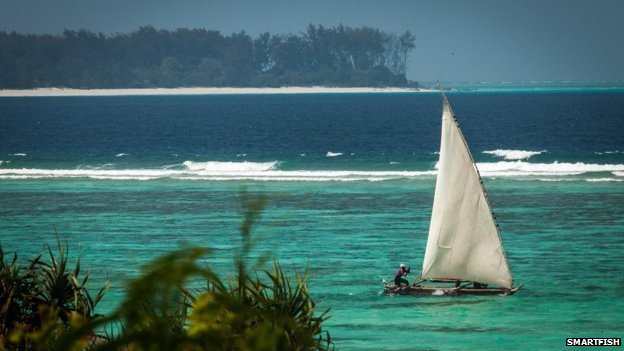
The rich marine life off Tanzania's coast is coming under threat because of blast fishing - a technique using explosives that some fishermen use to maximise their catch.
''Blast fishing destroys the fish habitats under water where fish reproduce and that has had a big impact, especially on us who use ring nets to fish," a 32-year-old fisherman says.
"The number of fish has drastically reduced we are not able to catch many fish like before," he said as prepared his wooden boat to go fishing in the calm and beautiful waters of the Indian Ocean.
Small fishing vessels like his dot the coastline that hugs Tanzania for thousands of kilometres.
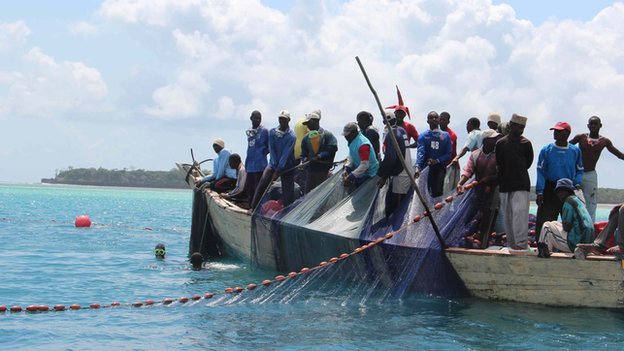
Fisherman who use ring nets say their catches have been affected.
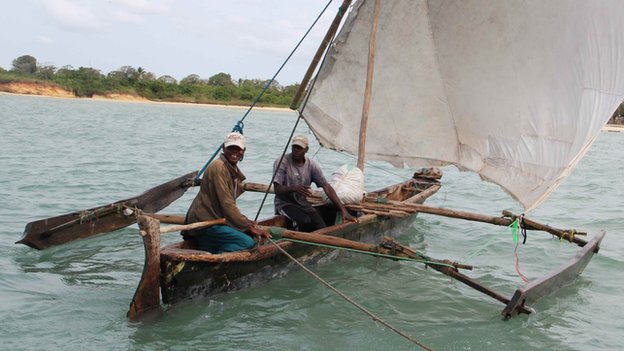
Fishermen say they face intimidation if they report those using dynamite.
He and his colleagues have informed the police in the past about those who use the crude fishing method, but it did not stem the practice.
"When they are arrested they bribe and come back, and if they find out that you reported them they mark you and threaten to hurl explosives on your boat, so sometimes we are scared to report them," he said.
Coral reefs in peril
According to Smart Fish, a fisheries programme funded by the European Union, Tanzania is the only country in Africa where fishing using explosives still occurs on a large scale.
Although it is illegal, it occurs along the entire Tanzanian coastline, from Mtwara to Tanga, and off nearby islands. There have also been reports of blast fishing off north Zanzibar.
Baraka Mngulwi, the assistant director of the government's Fisheries Resource Protection department, says the explosives are often taken from mines and demolition and road construction firms, or made at home.
The explosives are usually lit with small fuses and tossed overboard.
The underwater shock waves produced by the explosion stun the fish, rupturing their swim bladders - the organ which helps control their buoyancy.
So they float to the surface and are then scooped up by waiting nets.
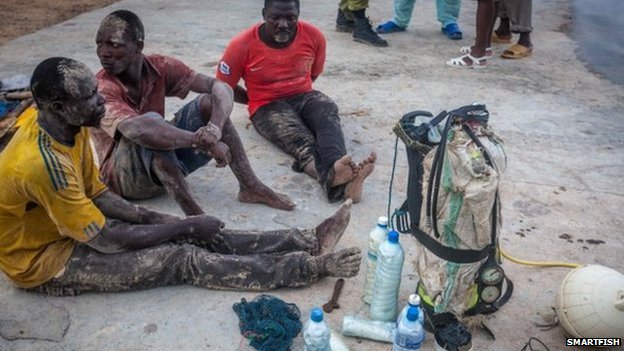
Fishermen who are found guilty of blast fishing face five years in jail
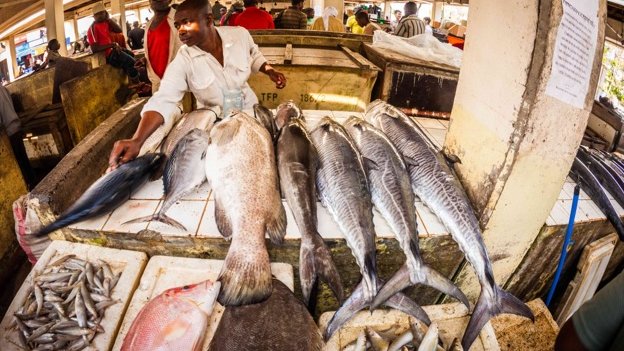
People find it difficult to identify which fish have been caught using explosives
Experts say one blast is enough to kill all fish and other living organisms within a 20m (66ft) radius - up to 400 fish can be netted in each explosion.
In the process, the underwater coral systems, home to countless marine species, are reduced into rubble.
Michael Markovina, a SmartFish officer, says coral reefs left in the wake of a series of blasts resemble a shelled city.
"If this illegal practice is not stopped, gradually Tanzania could easily end up with a wasteland of ocean," he says.
Damaged coral reefs lead to an instant decline in fish species diversity and quantity - and in the long-term the ecosystem is unlikely to recover.
=========================================================================
Blast fishing in Tanzania:
- Began in the 1960s, was brought under control in the 1990s but has surged in recent years
- 25% of all marine species are associated with coral reefs
- Each blast kills all fish and other living organisms within a 20m radius, completely destroying the coral reef habitat and there is no natural recovery
- Explosives are cheap and easily accessible, usually sourced from mining, demolition and road construction enterprises, or made using artificial fertilisers and diesel
- Banned in 2003 with a minimum sentence of five years for dynamite fishing and 12 months for possession of explosives
Source: SmartFish
=========================================================================
It is very difficult to track down the illegal fishermen, as I found out when I joined a fishing patrol.
There is a very secretive and apparently sophisticated network in place.
All the fishermen I met during the patrol were quick to deny involvement in blasting, which also endangers the fishermen - there are frequent accidents and injuries.
A former dynamite fisherman who now campaigns against the practice says he lost both his hands in an accident.
"They were ripped off when an explosive I was setting up blew off in my hands. I used to light the explosives with fuses and toss them into the ocean," Mwanya Sleiman, 50, told the BBC.
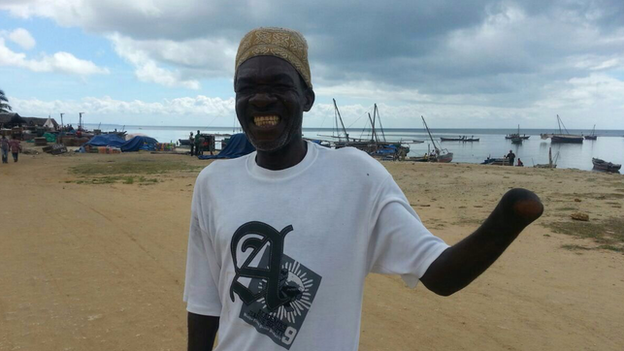
Former blast fisherman Mwanya Sleiman, who lives on Mafia Island, now campaigns against the practice.
"My motivation was just the money I got from selling the fish but I didn't know about the impact it would have on me or the underwater environment."
Those caught blast fishing can be sentenced to five years in prison and a further 12 months for possession of explosives.
But when one blast can lead to a catch of up to 400kg (62st 9lb) and a profit of $1,800 (£1,093), the temptation is great.
Acid attack
At Dar es Salaam's busy fish market, fishermen bring their catch every morning to hundreds of waiting traders. The demand outstrips supply - and auctioneers quickly sell the catch to the highest bidders.
The speed of the transactions means there is no time to find out what fishing methods are used.
One of the auction officers says not many people can identify fish caught using explosives.
"If you are not experienced it's very difficult to identify fish caught using explosives. Out of 60 auctioneers maybe two or three can tell,'' Bala Gomwa, 41, tells the BBC.
A female trader says she can identify them as their scales are very loose.
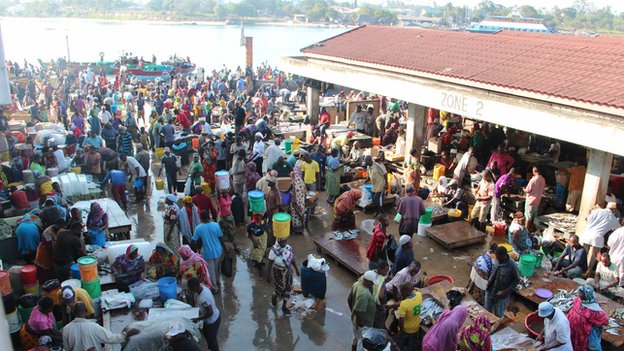
The speed of the auctioning at Dar es Salaam's fish market does not allow time to enquire about fishing methods.

The market is crowded with fish traders - some of whom say loose scales indicate blast fishing.

The city's fish market is also a popular place to come to eat
"We don't buy them; because of the impact of the blasts, they rot very fast - by the time you get home they are rotten. Some buyers and sellers don't know that so they buy them,'' she says.
The government admits it is facing a huge challenge in stopping blast fishing, and Mr Mngulwi says some magistrates do not help by not imposing tough sentences.
SmartFish has helped the government confiscate 300kg of explosives, impound 50 fishing vessels and prosecute five cases of illegal fishing in the past 24 months.
But a recent report by the non-governmental organisation Sea Sense, which works with coastal communities to protected endangered marine life, says intimidation is the major problem.
It cites an example of a patrol officer who lost his eye and suffered other facial injuries after acid was thrown at him.
Mr Sleiman urges the perpetrators to learn from his experience.
"I want the future generation to find a conserved Indian Ocean so that they can also enjoy the resources."
BBC News - Blast fishing destroying Tanzania's marine habitats